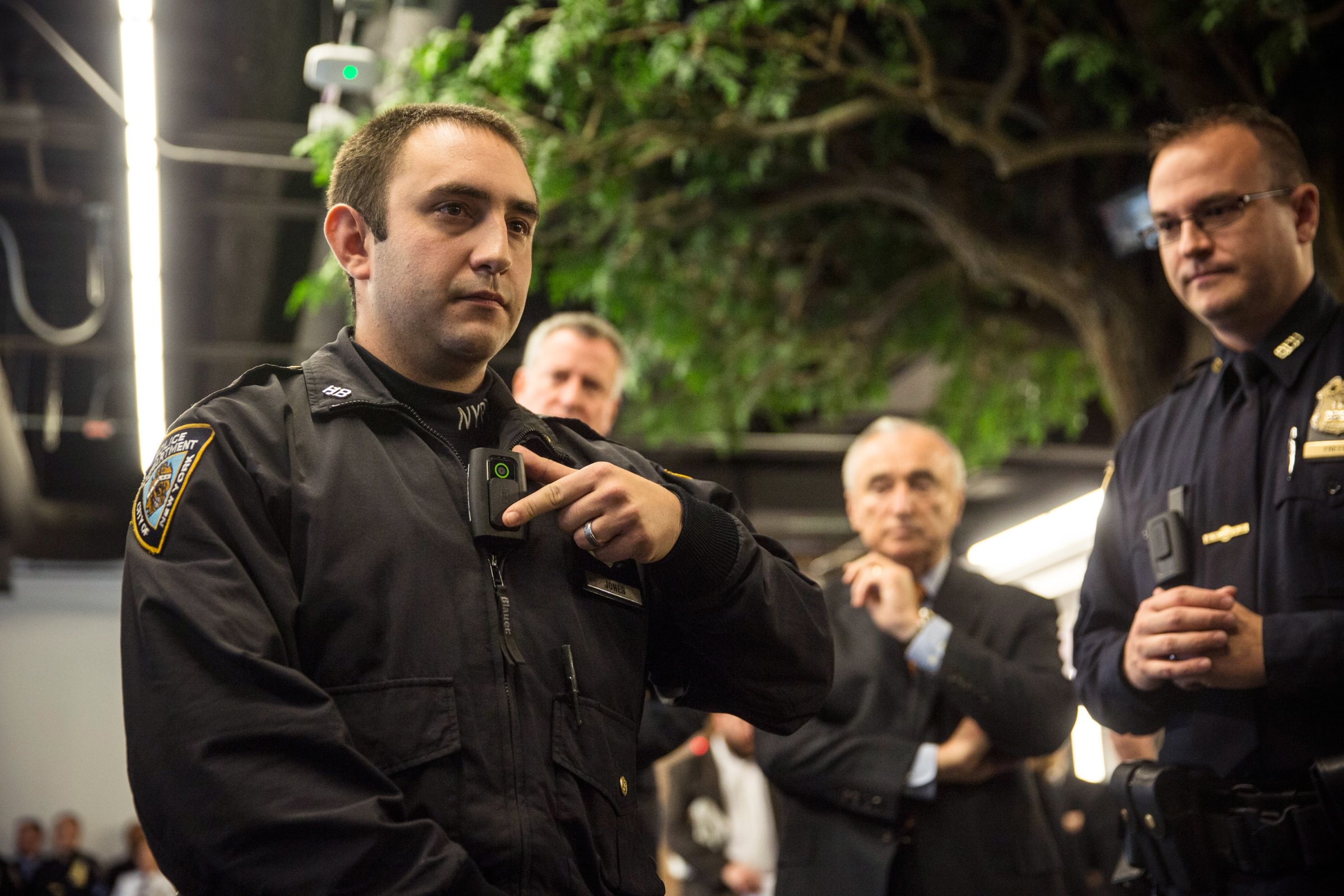
If you’re outraged—and you should be—that no indictment followed Eric Garner’s death at the hands of the New York Police Department, thank the people who captured the attempted arrest gone horribly wrong from different angles on their cellphone cameras. And start pushing for laws and procedures that not only provide legal protection for citizens who film police but outfit cops with wearable cameras and other recording devices.
Such technologically enabled transparency won’t end all disputes between citizens and law enforcement but it will go a long way to providing clarity in ambiguous cases and, as important, minimizing bad actions by police and suspects alike. It will also have an impact on protests that always have a potential for violence on the part of marchers and authorities.
If official and crowdsourced footage of the confrontation between Michael Brown and Ferguson policeman Darren Wilson existed, it may well have minimized the subsequent protests, militarized response to demonstrators, and the widely criticized grand jury proceedings in Missouri.
Amateur video abounds in the Garner case. Cellphone footage plainly shows cops putting the 350-pound man into the chokehold and other restraining moves that a coroner ruled killed him (chokeholds are explicitly banned by NYPD rules, which should give even police defenders pause). Other video shows NYPD officers standing haplessly over an unmoving, apparently dead Garner for minutes, attempting no resuscitation. The footage is not just disturbing as hell—Garner is heard shouting, “I can’t breathe, I can’t breathe” repeatedly before he expires—it’s the reason why people across the political spectrum are disgusted by the grand jury ruling. As Rep. Justin Amash, a Michigan Republican who is also a lawyer, tweeted, “Clearly excessive force against #EricGarner.”
These are not pretty pictures but they are essential viewing if you want to understand how the police operate and why so many Americans, especially racial and ethnic minorities who tend to have more run-ins with police, feel about law enforcement.
Given how they come off in the Garner footage, it’s understandable why police routinely try to shut down citizens photographing or videotaping them in the line of duty. Indeed, last August, police in Ferguson arrested several reporters for doing just that. That sort of thing is hardly an isolated incident, either. While there is a court-recognized right of citizens to record the police, there’s also little question that cops and law enforcement at all levels are waging nothing less than a “war against cameras.”
Ironically, cameras are in many—maybe most—instances the police’s best friend. Dashboard-mounted cameras have become standard equipment for most highway patrols and routinely exonerate patrolmen accused of misconduct. Back in August, former NYPD police commissioner Bernie Kerik, who implemented dash cams for his force, said that such footage overwhelmingly vindicates police versions of events. Not only that, they have a calming effect. “If a trooper loses his cool,” a spokesman for Pennsylvania Highway Patrol told The York Daily Register, “The trooper will have to answer for his actions.”
And they will also have to answer when they turn off or mess with cameras at inopportune moments. The Albuquerque, New Mexico PD did just that earlier this year when it fired a member for failing to turn on her body camera before engaging in a fatal shooting.
You don’t have to believe that “everyone behaves better when they’re on video” to recognize the vast benefits of ubiquitous video from official and distributed sources. It might have prevented violence in Ferguson in the wake of the Michael Brown shooting (it may even have helped to avoid the incident in the first place). While it did not help to bring an indictment in the Eric Garner death, it has raised disturbing and totally legitimate issues about police behavior and techniques. Those are good things, even if they are born out of tragedy.
Police should actually be the most supportive of increasing the amount of footage, especially footage taken by cameras they’re wearing. A year-long study of the Rialto, Calif., police department found that using “officer-worn cameras” reduced use-of-force incidents by 59% and reduced complaints against the cops by 87.5%. Between the Brown and Garner deaths—and cases such as the one in Cleveland where police shot and killed 12 year old Tamir Rice—law enforcement needs to work hard to regain the trust and confidence of the American public. Assuming they are acting in good faith and in accordance with proper policies, literally being able to show things from their point of view may be one of the best ways they can reassure us all.
Nick Gillespie is the editor in chief of Reason.com and Reason.tv and the co-author with Matt Welch of The Declaration of Independents: How Libertarian Politics Can Fix What’s Wrong with America.
More Must-Reads from TIME
- Donald Trump Is TIME's 2024 Person of the Year
- Why We Chose Trump as Person of the Year
- Is Intermittent Fasting Good or Bad for You?
- The 100 Must-Read Books of 2024
- The 20 Best Christmas TV Episodes
- Column: If Optimism Feels Ridiculous Now, Try Hope
- The Future of Climate Action Is Trade Policy
- Merle Bombardieri Is Helping People Make the Baby Decision
Contact us at letters@time.com